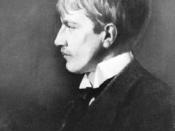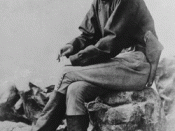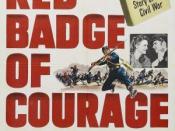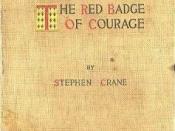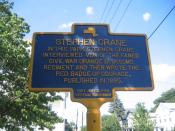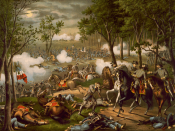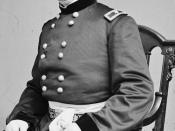Heroism is a hard thing to define. In Stephen Crane's novel The Red Badge of Courage Henry Fleming is definitely a controversial character. In the beginning he shows major signs of cowardice by fleeing from his regiment's, the 304th, first battle. By the end he's become a courageous soldier, engaging in selfless acts of bravery.
In the start Henry's regiment does nothing but march and do drills. Already his views on heroism, courage, and the war start to drown. But the day must come, the Lieutenant reported that the 304th would march to the line and begin fighting. Minutes after they arrive he flees the line with shame and cowardice. Here he displays nothing but fear, nowhere near heroism, and his dream of great courage.
During the heart of the book Henry wonders among the vast forest. He stumbles upon a dead body rotting, it symbolized the worthlessness of a single life.
He becomes afraid a runs. As he wonders he sees many men, and thinking of their naive ways of thought and that they could soon be that body, but wishes to be them all the same. Finally he finds his regiment, a little bruised to the head, he rejoices with his friends. Throughout this part Henry spends most of the time in his head, trying to convince himself he was right to flee. After he got back to camp he perceived that if other people thought something was true then it was. But all the time his bruise was not a "Red Badge of Courage" but shame.
As Henry rejoices with his regiment, the enemy is advancing and taking position. Henry leaves for water for a hurt friend when he reaches a ridge letting the eye peer above the whole battle. He over hears the general giving orders to sacrifice his regiment, the 304th, to advance the line. He runs back to their camp, keeping the news to himself. As they begin moving he plans to prove the general wrong. Once they get to their position they get beat down by a rain of bullets. He sees that the lieutenant and his friend are still alive, while he observes many men fall with blood and gore and takes charge of the regiment. He begins a retreat back to camp, once there the general who gave the order mocks them and the short distance they traveled. Here Fleming begins a turning point. He his no more that fear driven, coward of a boy, but more of a courageous hero for getting his regiment out.
Now toward the end of the war what's left of the 304th and the union army advance again and lastly into battle. As Henry stays back he sees that the flag bearer has been shot. Him and his friend rush to grasp the flag, prying it from the dead and lifeless hand, they both take the glory and lead the army on. As they press against the enemy and they begin to flee, the blue advance, Henry pulls the flag from Wilson and bears it alone. When they clear the smoke Henry notices that the enemy flag bearer is wounded and Wilson grasps the flag as the union drive to victory. Now Henry is that great hero, with courage, selflessness, and bravery, He has surcome to that great glory he had always wished. His views on war have changed dramatically, from only courage and greatness, but now he sees the death and despairs too.
Henry learned to deal with shame and turned the shame to honor recognized as a hero. In the end, Henry worked hard and was a real leader. He learned that the most important lessons in life can be seen by opening his eyes. Henry learned how important life truly was and why. He learned that war deals with death, shame, and sorrow, not just victory, freedom, and heroism. Henry looked death in the eyes and fulfilled his dream of becoming a hero.
